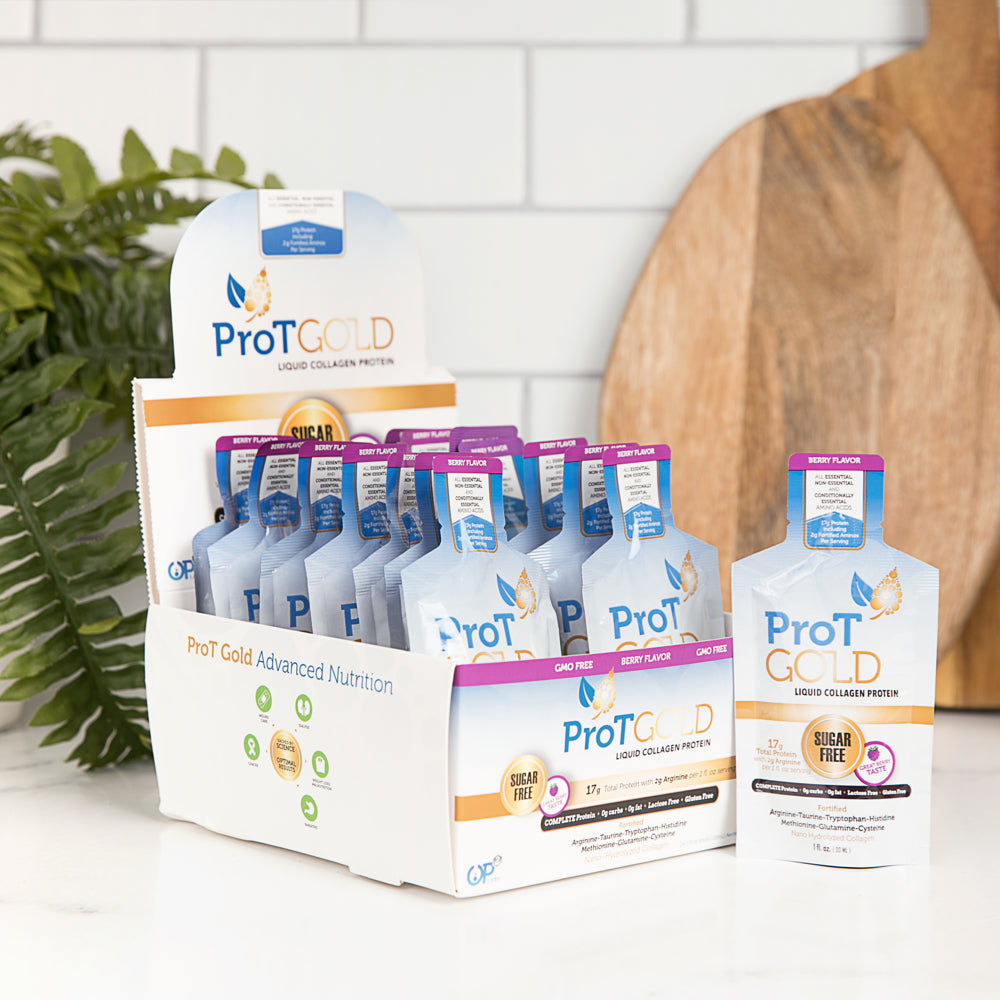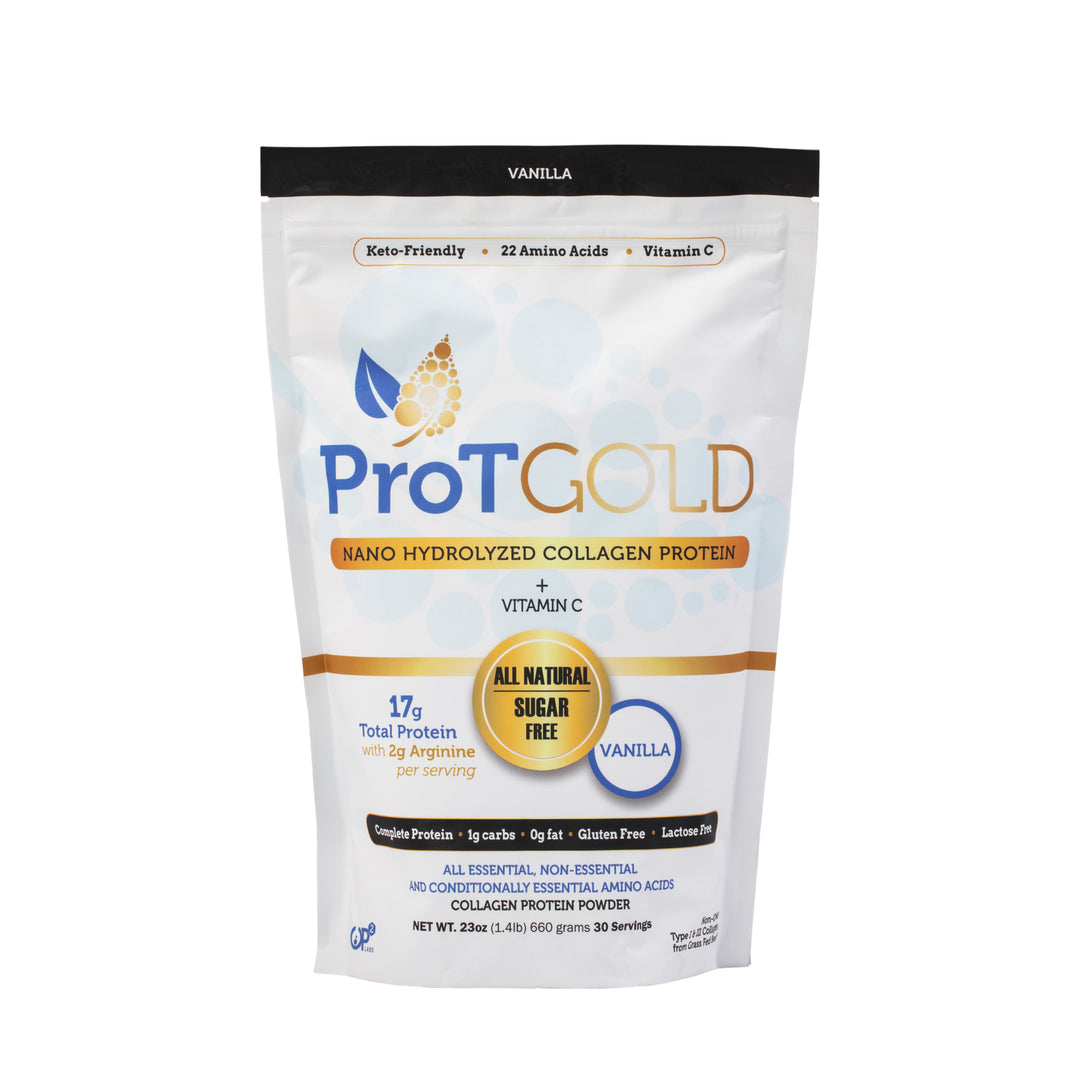Does Protein Help You Lose Weight? Here’s Why It Might
Science has shown that multiple factors impact weight loss - diet, exercise habits, genetics, age, gender, stress, and even sleep habits. But does protein help you lose weight?
While many people relate protein to muscle building, or even to weight gain, research has started to show that protein does help you lose weight when used correctly.
So, how does protein help you lose weight?
Today, we will look into some of the scientific reasons why protein does help you lose weight, how to get the right amount of protein in your diet, and why we think liquid collagen is the best protein for weight loss.
6 ways protein helps you lose weight
How does protein help you lose weight? Let’s dive into the ways! Here are six research-backed reasons why protein helps you lose weight.
Protein helps to build muscle
Now you might be thinking: “Hold on, I’m looking for ways that protein helps you lose weight, not gain weight.” But bear with us!
There is a huge difference between weight gain from fat and weight gain from muscle.
In fact, when on a weight loss journey, you should be way less concerned about the number on the scale than your body composition and measurements. These are much better indicators of your health.
Your muscles are built by protein consumption, but they are also maintained by protein, which requires energy. That energy is provided by the burning of calories.
Just by simply existing, muscles burn more calories than fat. Consuming more protein helps you lose weight by building lean muscle, which burns more calories, and helps fuel any exercise you undertake during your weight loss journey.
Protein may increase your metabolic rate
Perhaps one of the most exciting characteristics of protein is that just simply consuming it may help boost your metabolism.
Metabolism is made up of 3 factors:
-
Resting metabolic rate - The energy your body uses to breathe, circulate blood, and perform other survival functions.
-
Activity thermogenesis - The energy used when you engage in any activity or exercise.
- And the thermic effect of food - The number of calories necessary for digesting and absorbing nutrients from the food you eat.
Each one of these factors makes up a percentage of your body’s total energy expenditure.
For most people, thermogenesis from physical activity comprises about 10% of total energy expenditure, while resting metabolic rate accounts for anywhere between 60 and 70%.
The thermic effect of food (TEF for short) varies based on what you eat, and protein has a much higher rate than carbohydrates or fats. This means it takes more energy for the body to break down protein than it does fat or carbohydrates.
Protein has a TEF of 25-30%, so if you eat a snack that includes 100 calories of protein, you’ll burn 30 calories just by chewing, digesting, and absorbing the protein from that snack!
Studies have shown that people who eat a high-protein diet often burn around 100 calories more per day than those who eat a more traditional diet centered around carbohydrates.
And, not only does protein help you lose weight when you consume it, the increased muscle from protein consumption ALSO helps boost your metabolism! It’s a compounding benefit.
You may already be starting to see why consuming protein helps you lose weight, but our list isn’t over yet. So how else does protein help you lose weight?
By targeting hard-to-lose belly fat.
Protein can initiate belly fat burn
Research has shown that the more high quality protein you ingest, the less abdominal fat you will have. For people who are trying to lose weight, this is great news, as belly fat is often the first thing they want to lose!
It is also important because fat surrounding your internal organs is associated with many chronic diseases. Belly fat is known to be a major causal factor in the development of deadly cardiovascular disease, strokes, hypertension, type II diabetes, and more.
Protein protects your existing muscle mass
You may have heard medical professionals talk about the importance of eating enough protein when trying to lose weight. This is because protein is key in preserving muscle mass.
When you eat at a caloric deficit and exercise, your muscles will be targeted as energy sources before your stored fat is. That means you can make yourself even weaker, and still not lose body fat!
Therefore, to make sure your body is burning fat as fuel instead of muscle, you need to ensure you are getting enough protein in your diet.
Protein makes you feel full
Have you ever noticed how easily you can eat a stack of your favorite cookies before your body tells you it’s full?
I’ll bet you could eat more cookies or chips than almonds or steak.
That’s because protein instigates different hormonal responses than fat and carbohydrates within your brain and digestive system.
When you eat protein, the amino acids trigger significant increases in peptide YY, cholecystokinin, and GLP-1 - which tell your brain that you are satiated.
Feeling satiated earlier on means you will be less likely to consume unneeded calories, which is another reason why protein helps you lose weight.
Protein keeps you full for longer
Protein not only helps you feel full more quickly but helps you feel full for longer. That’s because protein also reduces levels of the hunger-inducing hormone, ghrelin. This is yet another reason why protein helps you lose weight.
Protein is by far the most filling nutrient, and knocks carbohydrates and fat out of the water when it comes to preventing overeating.
One often-cited study showed diets consisting of 30% protein led to participants eating 440 calories less per day than those eating less protein!
Protein may help you keep the weight off
Not only does protein help you lose weight, it may also help you keep weight off long term.
Research has shown that higher protein diets are better at maintaining weight loss over time. By eating a satiating diet high in protein, you are less likely to snack on empty-calorie foods or overeat.
One study even demonstrated that increasing your daily nutritional protein intake from just 15% to 18% led to a 50% lower body weight regain later on.
So there you have it, protein does help you lose weight. But we’re sure you still have some questions, so we’ve put together a helpful FAQ list for you to help you understand how much protein to take, what type of protein to take, and more.
FAQs about protein and weight loss
Here are answers to commonly asked questions about protein intake and weight loss:
Does protein help you lose weight - no matter the calories?
While protein is clearly a superstar in helping support weight loss, it is important to remember that consuming too much of anything will cause weight gain.
Protein-rich foods tend to pack more calories into smaller packages. For example, just two tablespoons of nut butter can contain over 200 calories!
Calculating your optimal protein intake is key to avoiding calorie overload. It will also help you avoid potential health problems that can arise from consuming too much protein.
How much protein should you eat a day to lose weight?
To be safe, you should ingest three-fourths of your ideal body weight (but no more than your current body weight) in grams of protein daily.
For example: If your ideal healthy body weight is 160 lbs, but you currently weigh 220, your ideal daily protein intake range would be 120 - 165 grams.
Does protein really burn belly fat?
Protein helps to burn all fat, so yes, it does target even hard-to-lose belly fat.
How much weight can you lose by eating protein?
Everyone’s body is different, so the amount of weight you can lose and speed at which you lose will vary. In the study listed above, the people who ate 440 less calories per day on a 30% protein diet lost an average of 12 pounds in 3 months - so about a pound a week!
What are the best high protein foods to eat?
Some great high protein foods to include in your diet include:
-
Meats - Chicken, turkey, pork, lean beef, etc.
- Fish - Salmon, trout, tuna, sardines, etc.
- Eggs
- Dairy - Milk, cheese, yogurt (particularly Greek yogurt)
-
Legumes - Chickpeas (hummus), lentils, fava beans, kidney beans, etc.
- Nuts & seeds - Almonds, walnuts, pumpkin seeds, sunflower seeds, etc.
What protein is best for weight loss?
When it comes to supplementing your weight loss journey, not all protein sources are equal. While getting protein from whole foods is vital, it can be difficult to get the right amount of protein through food alone.
Many health-minded people have turned to protein supplements to make sure they get enough protein to help them lose weight.
Medical professionals emphasize the importance of choosing a protein supplement that is free from heavy metals and potentially inflammatory fillers, which are found in many products.
Another allergen often found in protein supplements is lactose. Whey protein is one you may have encountered. If you are potentially lactose intolerant, or find you have issues with digestion, you should stay away from whey protein and find an easily-digestible alternative.
So, what’s the solution?
We recommend liquid collagen to lose weight. In particular, a high-quality hydrolyzed collagen product with no added sugar will be the best liquid collagen for weight loss.
Why do we recommend this liquid collagen to lose weight? Let’s examine the weight loss benefits of collagen.
Collagen protein for weight loss
Perhaps the most effective type of protein supplement for weight loss is liquid collagen.
Collagen is a natural protein your body uses to build and maintain muscles, bones, and connective tissues. High-quality collagen supplements contain no additives and can be absorbed well by the body. This is especially true if they are hydrolyzed.
You see, there are different types of collagen - both in their organic makeup, and in their manufacture. Hydrolysis is a chemical process used in manufacturing that breaks down collagen molecules into easy-to-digest pieces.
Hydrolyzed collagen is also sometimes referred to as “collagen peptides.”
Using collagen peptides means you can fully absorb your supplement and make use of its weight loss benefits. Of course, collagen peptides benefits extend far beyond just weight loss.
Collagen may help with joint pain, wrinkle reduction, gut health, and swifter wound healing - to name a few.
Collagen peptides also allow joints and bones to stay strong and repair themselves more easily. This helps you to avoid injury and promote muscle growth during physical activity which, in turn, helps with weight loss.
If you’re wondering: “How much collagen should I take to help with weight loss?” We recommend about 10 to 15 grams of collagen up to three times a day.
Of course, as mentioned above, not all protein supplements are created equally, and collagen is no different. So, which collagen is best for weight loss?
Which collagen is best for weight loss?
Answering which collagen is best for weight loss is easy. The best collagen products have no additives, no sugar, and have been hydrolyzed or nano-hydrolyzed for easy absorption. We also recommend liquid collagen, as it is even easier to drink and absorb.
When choosing liquid collagen to lose weight, make sure to read reviews, and find a trusted source for your collagen protein, as protein supplements are usually not regulated by the FDA.
While looking for a high-quality collagen protein to help you lose weight, look for collagen that is not only nano-hydrolyzed, but is also medical-grade. This means it IS regulated by the FDA, so it’s a trusted source of collagen protein used in medical facilities nationwide.
If you’re looking for the best collagen for weight loss, a high quality, medical-grade collagen protein might just be the ticket.









